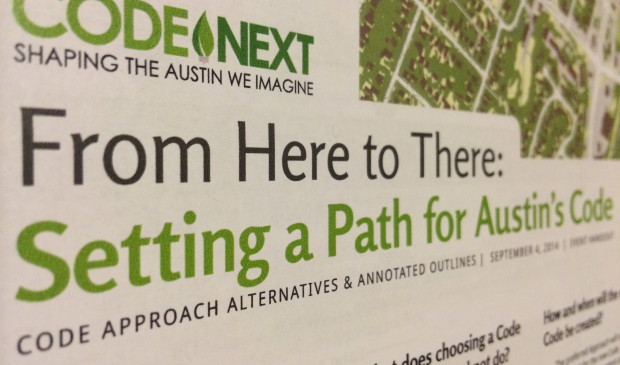Planning Commission weighs in on CodeNEXT
Thursday, October 2, 2014 by
Elizabeth Pagano Austin’s Land Development Code rewrite continues to move forward, and its first major decision point is almost here.
Opticos principal Dan Parolek told the Planning Commission last week that the approach alternatives were an important milestone in the code rewrite process. However, he stressed that the code approach did not actually involve revisions to the code, neighborhood plans or deciding where revisions will take place.
“What the selection of the code approach does is that it simply gives the CodeNEXT team a really solid foundation jumping into the rewrite of the Land Development Code early next year,” said Parolek. He said that the past nine months of listening to the community was the “most extensive listening process we’ve ever done in a code rewrite process.”
Commissioners chose between three approaches: the brisk sweep, the deep clean and reset, and the complete makeover. Of those choices, Opticos is recommending the deep clean and reset. Parolek stressed the importance of the “reset” in this choice.
“We’re throwing the old organization out, we’re throwing the old structure out, and we’re starting with a new organizational structure. That’s really, really important, because that gives us the ability to create the most usable, concise new land development code,” said Parolek, who explained they would also be creating a framework for implementing form-based code.
After some discussion, the Planning Commission recommended the suggested middle approach to the code rewrite in a vote of 7-0-1, with Commissioner Nuria Zaragoza abstaining and Commissioner Richard Hatfield absent.
Parolek said that with that starting point, it would be easy to implement form-based code — which focuses on the appearance and form of buildings, not their use — in other parts of the city. He said his team would be making an effort to educate the public about what form-based code is, moving forward.
“I feel really strongly that you cannot achieve the implementation of Imagine Austin with the Euclidean zoning code (currently in place),” said Parolek. “I often talk about the paradigm shift that is necessary in zoning, because Euclidean zoning was created as a system almost 100 years ago, to separate uses. Now we are trying to use it to regulate complex urban environments. It’s a proven failure. Form-based coding isn’t the only solution, but it’s the solution we’ve found to be most effective.”
That said, Parolek pointed out that zoning wasn’t a “silver bullet” and wouldn’t solve development pressures on its own.
Commissioner Stephen Oliver worried that the city wasn’t providing clear policy for the consultants and that there wasn’t “an effective road map” to help get the project through the mapping process. He said it was important to start focusing on rollout questions now, which was among the commission’s recommendations, as was a strong urging to provide more policy direction for Opticos where needed.
Planning and Development Review Assistant Director George Adams pointed out that there were “so many initiatives out there” that integrating and understanding them within the context of CodeNEXT was a huge challenge — for the community, for commissioners, for consultants and “certainly” for staff. “All I can say is that we are working very hard to coordinate those, and to integrate them, to the extent that we can, into that process.” Parolek asked for trust, saying they were “committed to interpreting that in the right way, and confident that they could do it.”
“I think you’ve done great work,” said Planning Commissioner James Nortey. “But, in Austin, we talk things to death. I just want to this process to succeed, and I don’t want people to simply react out of a fear of change and sabotage what could be a really great experience for Austin.”
There were, in fact, a number of people on hand to discuss the approach alternatives. HousingWorks board president Frances Ferguson urged the city to move forward with the recommended approach. Ferguson stressed the need for a growing supply of housing, which she said was the fundamental tool of affordability.
Katherine Loayza, a retired city planner, spoke against the recommended approach on behalf of the Real Estate Council of Austin. She called for more aggressive changes and stressed the need for a by-right review process.
“Without any teeth in making a hybrid code apply, I do not see how we will get anything other than a reorganization of the complicated, outdated code that we now have,” said Loayza. “This is unacceptable.”
For the most part, those who spoke were signed up as neutral. Speakers took issue with the lack of clarity in the approach, the limited public participation and how green codes will be integrated into the future code.
City Council will hear a briefing on the approach alternatives today and is expected to vote on them at its next meeting.
You're a community leader
And we’re honored you look to us for serious, in-depth news. You know a strong community needs local and dedicated watchdog reporting. We’re here for you and that won’t change. Now will you take the powerful next step and support our nonprofit news organization?



